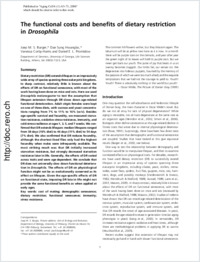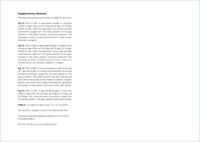The functional costs and benefits of dietary restriction in Drosophila
- Burger, Joep M. S. Department of Genetics, University of Georgia, Life Sciences Building, Athens GA, USA - nit of Ecology and Evolution, Department of Biology, University of Fribourg, Switzerland
- Hwangbo, Dae Sung Department of Genetics, University of Georgia, Life Sciences Building, Athens GA, USA
- Corby-Harris, Vanessa Department of Genetics, University of Georgia, Life Sciences Building, Athens GA, USA
- Promislow, Daniel E. L. Department of Genetics, University of Georgia, Life Sciences Building, Athens GA, USA
-
20.12.2006
Published in:
- Aging Cell. - 2007, vol. 6, no. 1, p. 63–71.
cost of mating
demographic senescence
dietary restriction
functional senescence
immunity
stress resistance
English
Dietary restriction (DR) extends lifespan in an impressively wide array of species spanning three eukaryotic kingdoms. In sharp contrast, relatively little is known about the effects of DR on functional senescence, with most of the work having been done on mice and rats. Here we used Drosophila melanogaster to test the assumption that lifespan extension through DR slows down age-related functional deterioration. Adult virgin females were kept on one of three diets, with sucrose and yeast concentrations ranging from 7% to 11% to 16% (w/v). Besides age-specific survival and fecundity, we measured starvation resistance, oxidative stress resistance, immunity, and cold-stress resilience at ages 1, 3, 5, and 7 weeks. We confirmed that DR extends lifespan: median lifespans ranged from 38 days (16% diet) to 46 days (11% diet) to 54 days (7% diet). We also confirmed that DR reduces fecundity, although the shortest-lived flies only had the highest fecundity when males were infrequently available. The most striking result was that DR initially increased starvation resistance, but strongly decreased starvation resistance later in life. Generally, the effects of DR varied across traits and were age dependent. We conclude that DR does not universally slow down functional deterioration in Drosophila. The effects of DR on physiological function might not be as evolutionarily conserved as its effect on lifespan. Given the age-specific effects of DR on functional state, imposing DR late in life might not provide the same functional benefits as when applied at early ages.
- Faculty
- Faculté des sciences et de médecine
- Department
- Département de Biologie
- Language
-
- English
- Classification
- Biological sciences
- License
-
License undefined
- Identifiers
-
- RERO DOC 6559
- DOI 10.1111/j.1474-9726.2006.00261.x
- Persistent URL
- https://folia.unifr.ch/unifr/documents/300224
Other files
Statistics
Document views: 166
File downloads:
- pdf: 216
- Additional material: 142

